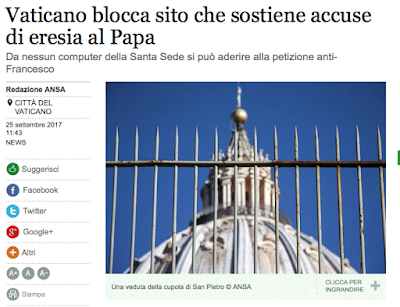Today, the world didn't end. It's now 12:33 AM GMT, so it's official. Instead, something else started. It's the first good news faithful Catholics have heard in a long time.
The Formal Filial Correction will be dismissed by all the usual suspects. The Pope won't say anything explicitly about it, of course. (It was actually sent to him six weeks ago.) Instead, his minions will go into overdrive with their "ankle biting," as Bruvver Eccles put it. They'll claim that it's just a few "conservatives" or "radical traditionalists" - people who get their jollies from bashing a liberal Pope. No doubt in the United States it will be associated with the machinations of the "alt-right" or whatever.
The only bishop to sign was Bernard Fellay, the Superior General of the SSPX. He apparently only heard about the Correction after it had been initially sent. His signature will allow the Pope's men to suggest that the effort is schismatic.
They can and will say anything.
It doesn't matter.
What does matter is that the Pope's heresies, associated with but not limited to the actual text of Amoris laetita, have finally been officially noted and corrected. On paper, as they say. Apparently this hasn't happened since 1333.
See, this Pope has brought us back to the Middle-Ages.
What we are seeing is the beginning of the process whereby Bergolio's malicious actions to undermine the Church and its teachings will be repudiated and rendered void by the Church itself.
Don't take my word for it. Take His in Matthew 16:18. If you are Catholic, you must take His word.
As for the Correction, Priests and lay Catholics did it, not bishops or cardinals. As much as it pains me to say it, Cardinal Burke, whose own long anticipated Correction never came, now looks a bit of a fool. Or he looks like someone who, if not a coward, was too timid by half for the task required. It's gone beyond him now. Perhaps he can almost breathe a sigh of relief.
It's a commonplace to say that the renewal of the Church and the purging of its poisons will take generations. Our grandchildren may live to see it, and all that. Maybe.
Or maybe not. Perhaps a moderate optimism about the near-term is more healthy.
Nicolae Ceausescu's rule was among the tightest in the communist world. It cracked and broke like an egg in a matter of days.
And then there was Poland's Solidarity. The spirits of many were crushed when martial law was declared in 1981. The Communists were just too powerful, it was claimed. Totalitarian regimes were...totalitarian. They had, it was argued, sort of a built-in defense mechanism that made them impossible to get rid of (except by outside armies). After all, it had never happened. That it would happen at all, let alone soon, was just too much to expect. Maybe our grandchildren would see it.
It appeared that way all the way up until the good guys won. No one who witnessed the fall of Communism in Eastern Europe can deny how unexpected it all was. One day you came home from work, flipped on the TV and saw people dancing on the Berlin Wall. It really seemed to happen that fast. "It will never happen" became "it was a forgone conclusion." How right. How obvious.
The good guys won because even when things seemed hopeless some of them didn't run from the fight. They knew that they had truth on their side even if it appeared they had little else. And yes, Solidarity used that iconic image of Gary Cooper in High Noon for its first election poster in 1989. Just one man doing the right thing. Solidarity's victory in that election meant the end of Communist rule in Poland and heralded the fall of the Wall in Eastern Europe later that year.
Is this a model for what will happen inside the Church? Some see Bergoglio as a Peron, or sort of a frumpy Che. But how about Ceausescu?
Or Wojciech Jaruzelski?
Too optimistic? Probably.
But it sure beats the end of the world.


